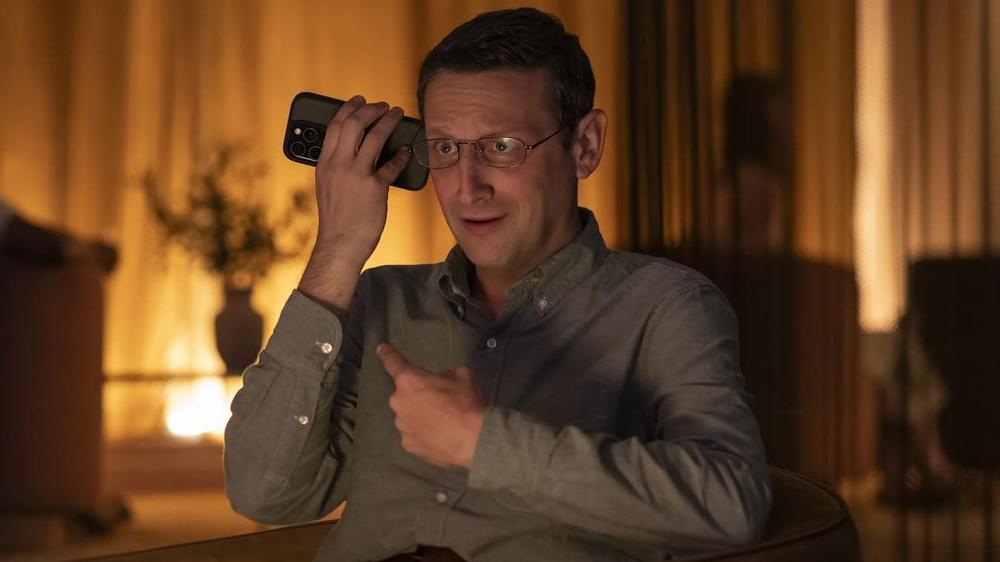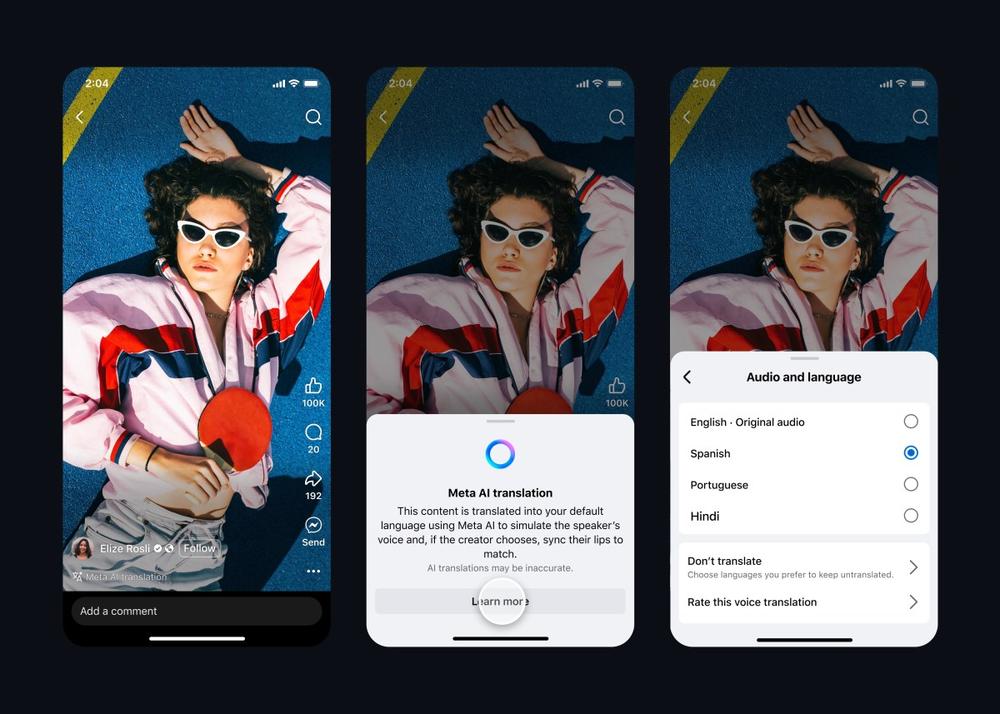The Chair Company debuts on HBO on October 12 at 10pm ET.
If you know anything about Tim Robinson, the ex-SNL writer who went on to revolutionize sketch comedy with Netflix’s I Think You Should Leave, it’s that his style of humor is surreal, often aggressive, and occasionally off-putting. What balances that forward-leaning comedy is that Robinson also makes sure that he’s the butt of the joke. Despite surrounding himself with atypical performers, he’s the one who weirds everyone out – or when he’s playing the straight man, the one who loses his temper – not the others with whom he’s sharing a scene. And with HBO’s The Chair Company, Robinson and his cohorts take things to the next logical extreme: What if what Robinson is making isn’t comedy, but horror?
Technically, The Chair Company is a half-hour comedy, filling the same 10pm slot as everything from The Righteous Gemstones to Entourage. Also technically, it’s a conspiracy thriller, as…well, critics are not exactly supposed to say what happens, which makes talking about specifics difficult. Here’s the official logline from HBO:
“After an embarrassing incident at work, a man (Robinson) finds himself investigating a far-reaching conspiracy.”
While we can’t reveal the embarrassing incident (for some inexplicable reason), we can tell you that Robinson plays William Ronald “Ron” Trosper, a surprisingly normal guy given Robinson’s oeuvre so far. He’s got a loving wife, Barb (Lake Bell); a daughter, Natalie (Sophia Lillis), who is about to marry her awful girlfriend; and a son, Seth (Will Price), who is going through some growing pains, is about to head off to college, and also has the world’s mildest drinking problem. Along with all that, Ron is thriving in his job designing outdoor malls, working for a company run by a man named Jeff Levjman (Lou Diamond Phillips).
Unlike the usual Tim Robinson character, Ron seems to have it all, including a steady head on his shoulders; he’s not the down-on-his-luck ad man trying to live up to his father’s legacy that Robinson played in the late, lamented Comedy Central series, Detroiters. He’s certainly not the frustrated marketing executive dealing (or not) with his wife’s cancer being in remission, who just wants to see the new Marvel (it’s supposed to be nuts) and instead ends up in a Single White Female-style spiral, as in the 2025 movie, Friendship.
While Ron does become increasingly unhinged after the "embarrassing incident” over the course of the season (seven of the eight episodes were provided for critics), and there are indications that this is far from the first time he’s gone off the rails, The Chair Company leans into the reality of the situation more often than not, actually embracing real emotion for Robinson’s characters as well as grounded relationships (unlike the often outrageous situations presented on I Think You Should Leave). All credit to Robinson and co-creator Zach Kanin, who previously worked together on SNL, Detroiters, and I Think You Should Leave, and effectively evolve their style to embrace the half-hour comedy format while also melding it with the longform darkness of Friendship (Andrew DeYoung, who wrote and directed that movie, also directs The Chair Company’s pilot episode).
Friendship, for all its laugh-out-loud funny moments, occasionally experimented with horror. A sequence in that film where Robinson explored dark tunnels circling under his town devolved into screaming and flashing lights straight out of any run-of-the-mill horror flick. But that movie tended to switch tones back and forth between scenes, highlighting Robinson’s cringe humor, with moments that wouldn’t be out of place in a Blumhouse movie. The Chair Company, by contrast, finds a happy medium, particularly in the first half of the season. Past the initial setup, once Ron dives head-first into a conspiracy that he may or may not have fabricated inside his own head, he explores everything from burnt-out warehouses and dangerous dive bars to the highest echelons of society. But scenes of weird scares manage to eke out both the tension inherent in your favorite scary movie as well as copious laughs.
Comedy and horror are separated by a knife’s edge, after all; both elicit similar reactions, with an uncontrollable sound pouring from your body – screams or laughs – often in unexpected ways. Horror films usually follow up those screams with laughter from the audience, a shared experience just like the best comedy films and shows, and both comedy and horror work best when there’s a sense of both inevitability and surprise. In horror, you know the killer is going to pop out and try to kill our heroine; it’s just a question of when. With comedy, a twist of a line can echo the twist of a blade – sharp and biting – or you can watch a character like Ron, knowing he’s going to screw up somehow, just not knowing the exact circumstances of how it will go ridiculously wrong for him in any given situation.
Also, to be clear: The show is funny, laugh-out-loud funny. And while it does actually hone in on an overall conspiracy plot that (sort of) makes sense, at least by the penultimate episode, it also gets more ridiculous as it goes, to the point that the seventh episode might be the funniest of the season. Some of Robinson’s frequent obsessions are on display throughout, like a recurring motif involving a clothing shop that specializes in shirts for men, or some side characters’ incredibly gross obsessions with food. There’s also some blatantly, graphically sexual content that Robinson likely couldn’t have gotten away with on Netflix, but on HBO, the home of sexposition? Anything is fair game, and like Nathan Fielder on The Rehearsal, Robinson takes full advantage of that HBO freedom…though he doesn’t build a whole airport or anything.
The show wouldn’t work, though, if it was just Robinson going hog wild. If anything, he’s the straight man in most situations, with everyone around him pushing and prodding him in different ways. His office mates only appear sparsely, but are clear enough in their comedy games that the company (which is not the chair company of the title) could power an Office-style spinoff of its own. Phillips in particular infuses his relatively scant screen time with exactly the right amount of kingly hubris. He’s a guy who runs a local outdoor mall company, but treats it like it’s a Fortune 500 firm, leading to a hilarious episode where he visits Ron at home and finds it isn’t what he expected.
On the flip side, Ron’s family definitely gets short shrift. Bell is always great in everything, but mostly gets to play the put-upon wife, trying to stay on an even keel while her husband spirals. Lillis is also a delightful bright spot in everything she appears in, but she’s reduced to a “supportive daughter.” Price somehow has even less to do as Ron’s son, getting the same sort of disregard given to Jack Dylan Grazer in Friendship. Perhaps Robinson just isn’t interested in sons as a whole…thing?
The character who gets the most to do in the show, though, and the likely break-out star of the season, is Joseph Tudisco as Mike Santini…but like the inciting incident, we’re not allowed to talk about who he is, or what role he has in the show. Just know that Tudisco manages to out-weird even the weirdest I Think You Should Leave character with his stilted delivery and oddball character quirks. At the same time, he injects a sweet soul into his interactions with…whoever he interacts with in the cast, which we can’t tell you; sorry.
If there’s one big knock against The Chair Company, it’s that even Robinson’s admirers would likely agree his humor isn’t for everyone. The show definitely leans more towards absurdity than the often shouty I Think You Should Leave or the cringeworthy nature of Friendship (at no point does Ron eat a bar of soap and tell his new friends he’s a bad boy who needs to be punished, for example). It’s definitely not as light and sweet as Detroiters, though that’s likely down to the absence of frequent Robinson collaborator Sam Richardson. Even with this modulation, however, The Chair Company is unmistakably Robinson.
In fact, while we don’t know at this time how The Chair Company Season 1 will wrap up, it’s a show and tone that feels right at home next to HBO’s Danny McBride series like Gemstones, Vice Principals, and Eastbound & Down. Like McBride, Robinson finds gems of actors hiding under rocks and never talks down to them, and also like McBride, Robinson seems singularly obsessed with those on the fringes of society, and how they tear down those who are in positions of authority. The big difference, though, is that unlike McBride, Robinson makes it a little bit scary while he does it.

 How Crimson Desert’s Combat Adds Fighting Game Flair to Fantasy Battles
How Crimson Desert’s Combat Adds Fighting Game Flair to Fantasy Battles